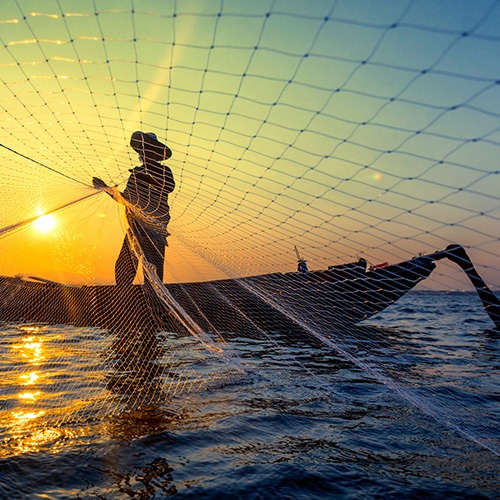We recently caught up with Clayton Nelson, General Manager of Policy & External Affairs at Austral Fisheries and Chairman of Seafood Industry Australia (SIA), on the Australian fishing industry, seafood, climate change and economic impacts globally.
What are your proudest moments during your four decades in the Australian fishing industry?
Throughout the time I have spent in the industry, there have been highs and lows, but each of these has been underpinned by a sense of pride in the work we do collectively as an industry.
In the early days, it was being part of an exciting phase of development and reward through effort, right through to now being part of a modern and mature seafood industry that has lifted standards of sustainability, safety, work practices and chain of custody.
I did not originate from a fishing family, but my wife and I have spent long periods at sea, and our sons have developed a deep love of the ocean and the marine environment.
I guess that last statement shows my proudest achievement: Family.
What’s your response to those who believe eating seafood is bad for the environment?
Firstly, eating seafood is a personal choice based on a range of factors.
Modern supplies of seafood are monitored, regulated, and traced, and the sustainability credentials are increasingly validated through either third-party accreditation or, in the case of artisanal fisheries, community expectation and social license.
When measured against terrestrial-grown proteins, the carbon footprint, water usage and chemical usage are far lower. Almost all Australian fisheries have reputable environmental credentials that fit with and, in many cases, exceed community expectations.
I would encourage people to explore the SeaBOS initiative, which is unique in delivering a positive message and impact through global cross-sectoral collaboration within the seafood industry.
How has the advancement in technology catapulted progress in sustainable fishing?
Three technological developments stand out for me:
Development of low drag nets, net monitors, fuel-efficient propellers, hulls, lead-free paints and Tier III engines have lowered fuel consumption and carbon emissions.
Innovations in gear development across a range of fisheries have reduced bycatch significantly compared to 10 years ago, allowing harvest strategies to be developed around target species.
Improved communications between fleets, crew and onshore teams via advancements in internet streaming capabilities have increased efficiencies and elevated at-sea standards for crew members.
These new capabilities have also allowed us to gather more information and data from vessels for real-time assessment, monitoring and research by the scientific community. This allows operators and managers to make decisions based on best-practice, science-based data outcomes.
Does the climate emergency keep you up at night?
The evidence of increasing temperature and acidification of our ocean is of great concern as it affects mangroves, seagrasses, and species shift in the marine environment.
We can all play our part in contributing to the reduction in emissions, and the best way to do that is to start at home and begin the process of setting our businesses and workplaces up for a future that will require fewer emissions and use alternative energy sources.
The quicker we act, the more impact we can have. There’s no denying, though, that lots of work is needed in the climate space, and this fact isn’t going away.
What is your word of advice to businesses along the supply chain in sourcing seafood?
Wherever you sit in the chain, know your suppliers and partners as well as you can, which includes their practices and policies regarding production, labour, sustainability and beyond.
Make sure that you are invested in how that seafood is harvested and produced so that you can make honest claims and representations regarding the origins of each product.
What is the role you see for independent, science-based international certification schemes like the MSC?
An independent auditing process is integral to providing bona fide claims and credentials around sustainable fishing practices and supply chains.
Every consumer has the right to ask about the practices used to get their marine protein from its source right through to their local seafood retailer or restaurant.
Independent verification of the chain of custody and fishing standards is a critical tool in the continued development and management of the world’s sustainable fisheries and in building social license and trust with the end consumer.
What is your outlook for our future despite the World Economic Forum’s latest Global Risks Report, which highlights global conflicts, sustainability setbacks, health crises, economic woes, societal anxieties, technology scares and many more?
There is no doubt that impacts from the past and present have thrown up some wicked challenges for our future, and we are now in an environment of uncertainty on many fronts. It’s my belief as well, however, that these challenges also present us with immense opportunities to not only curb these issues but re-think and reshape the way we do business towards a more sustainable and environmentally responsible future.
One of our challenges is to feed a growing global population while harnessing alternative energy sources that provide societal stability. Another is that poverty is increasing around the world, and unless we do more to address the issues of food and clean water availability, then unrest will continue to develop.
Addressing these challenges won’t be easy, and it will require new thinking, unlikely collaborations, and innovations to do so. But it’s in this space that we can hope to see technology used for good and industries evolve to provide new employment opportunities and practices that are solutions focused.
What is your all-time favourite fishing story?
When I was a 16-year young deck hand, ‘Deckie’, I worked during the Christmas holidays on a cray boat in a place called Little Freshwater Bay, South of Dongara in WA.
We lived in an old camp with a kerosene fridge and a single-cylinder generator for lights. Most of the fishers fishing in that area had been there for years and were from various parts of the world. There were guys like German Joe, Ollie the Pole, and the guy who I worked for named Bill Hellman – the one-eyed Finn - it was a league of nations! Of course, there were plenty of Aussies there as well to make for an interesting mix.
As a young Deckie, I was always keen to show that I was learning and hopefully adding some value to the fishing operation. We used a variety of baits, from cows’ hocks to herring and rabbits, that either had to be salted and dried or if we were lucky, the fish was received frozen from the Co-op truck every couple of days. The Deckies job was to chop and salt the hocks and rabbits, as we didn’t have enough refrigeration to keep them in a freezer. The smell was something else in the middle of summer, but that’s what you had to do, and it kept most of the flies in the same area!
Every Saturday, Bill would declare a town day, and we would either head to Geraldton or Dongara for the races and a few refreshments. If Bill had a win, then we would stay the night. On one trip to Geraldton, I remarked to Bill that I wondered why all the dead rabbits on the road had not been picked up by fishermen as this would save plenty of money on bait and that I could not believe that someone else hadn’t thought of it.
The next morning at 3 am, we left Geraldton with a very hungover Bill in the passenger seat and the head Deckie driving the Ute. To my surprise, and thinking I must have been onto a winner, Bill instructed us to pick up every dead rabbit and kangaroo between Geraldton and Little Freshwater and put them in the back of the Ute, where I had to sit. It didn’t take me long to work out that my suggestion was, in fact, not as smart as I’d first thought, and it took weeks to get the smell off me!
The moral of the story is that not everyone who comes before you are stupid, and there are plenty around that will happily enjoy some mirth at your expense. Bill was known and loved by all in the Geraldton and Little Rat Island community, and like many in our fishing community, was originally from a far-off land but made a huge contribution to the Australian fishing industry. I owe him a lot for my early entry into the industry and the life lessons he gave me.
What’s your favourite seafood species and dish with the family?
Our family favourite is simple whiting fillets coated in lightly seasoned flour and served with a couple of good salads, crusty bread, and a crisp glass of white on a summer day. Or the alternative is a feed of blue swimmer crabs in a good tomato and chilli sauce for a Sunday lunch, served with a cold beer.

This interview has been edited for clarity.



